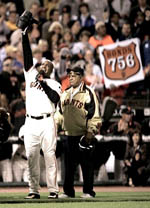
So this all starts last Wednesday when I’m getting my haircut. I always have interesting conversations with the woman who cuts my hair (Tsofia at Gary Manuel Salon). On this day in particular, we were comparing the kind of mileage we each get on our Prius. She averages 53mpg, my wife and I average 38 or 39 (what are we doing wrong)? Anyway, she tells me about this way you can modify your bike so you can carry these huge loads. It’s called the Xtracycle. I am intrigued.
Basically, the Xtracycle is a frame extension that moves the rear wheel back 15 inches or so. With the packing system, you can carry some truly amazing loads. The folks at Xtracycle figure that if they make it easier for people to cart stuff around, people will use their bikes that much more. And in poorer countries where used bikes are often plentiful, increasing the utility of a bike can also dramatically increase productivity.
I’m psyched about getting up and riding with my Xtracycle. I’m putting it all together tonight. I’ll let you know how it goes.



 Posted by johnlivengood
Posted by johnlivengood  I just saw the news account that Barry Bonds hit his 756th home run to pass Hank Aaron as the all-time home run leader.
I just saw the news account that Barry Bonds hit his 756th home run to pass Hank Aaron as the all-time home run leader.